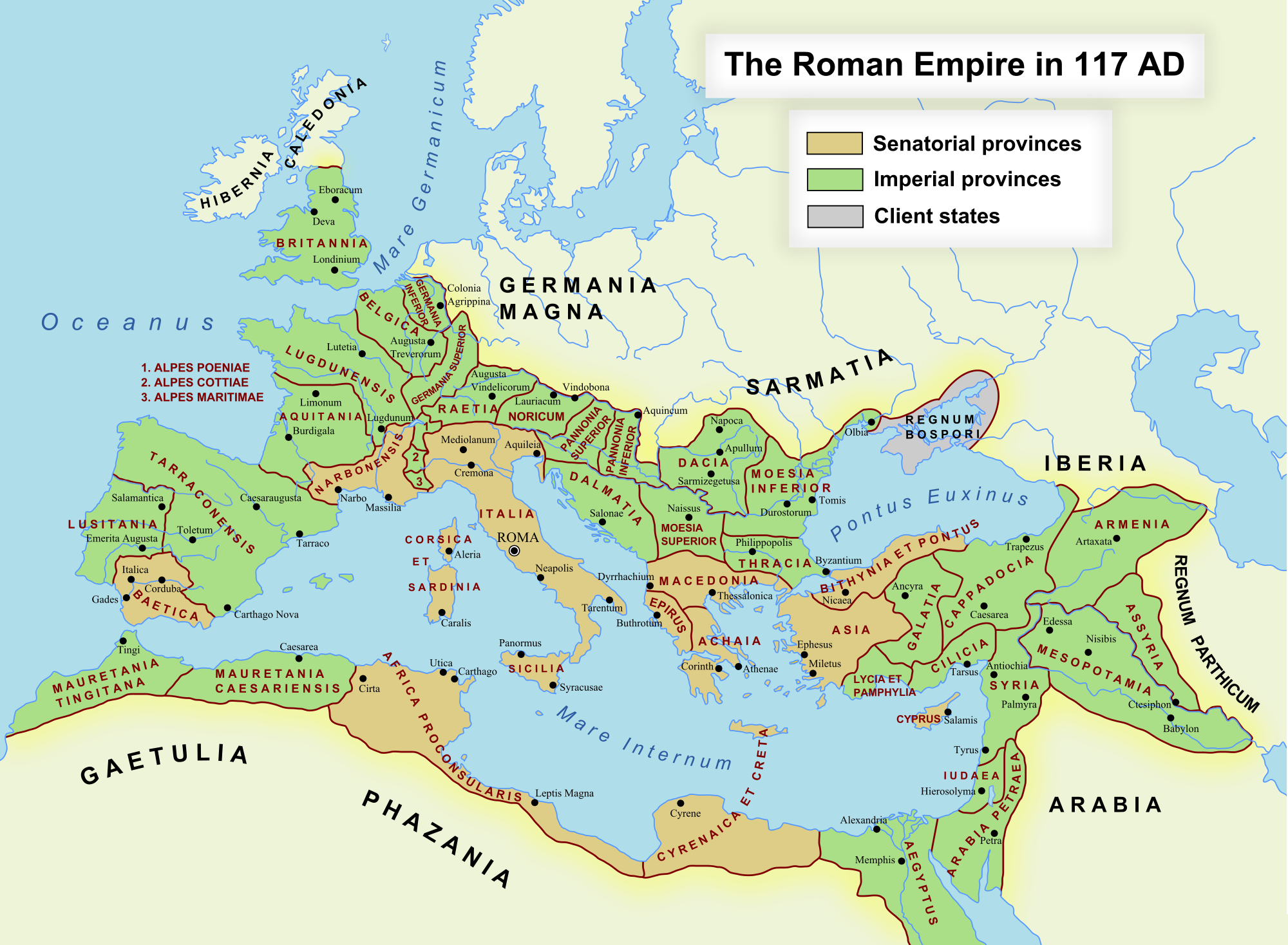
Map of the Roman Empire, A.D. 117
| Instructor: | |
| Time/Location: | online! |
| Contact Info: |
Office: Cesar Chavez 410 |
OVERVIEWHistory 205 traces the political, social, literary and cultural history of Rome over 1200 years: from the founding of the city of Rome (753 B.C.) to the so-called "fall" of the Western Roman Empire (A.D. 476). We will explore our subject primarily through the texts of Roman prose writers and poets, as well as modern historians; but we will also employ archaeological remains, artwork and other types of material culture to obtain a well-rounded view of the ancient Roman world. |
GOALSBy the end of this course, you should be able to:
|
READINGSThe required text is as follows:
This book is free to read online via the University of Arizona Library. If you would like to buy a hard copy, you may of course do so, but not at the UA Bookstore, since the book has NOT been ordered for this class. There are also a number of additional readings for this course. These will be hyperlinked to this page or made available for download from the D2L site for HIST 205 as pdf files: see the "Readings" area of the "Content" section. To view/download them, you will need Adobe Acrobat Reader (free download available here). |
GRADINGGrading for the course will be based on the following breakdown:
|
TEACHING ASSISTANTS AND OFFICE HOURSThere is one teaching assistant (TA) for this course, Lora Key (lmichellek71@email.arizona.edu), a PhD candidate in the UA History Department. Lora will be responsible for assisting with grading as well as answering questions about course materials and policies. Her office hours will be Wednesdays, 11 a.m.–1 p.m. and by appointment. Lora will be available via email during her office hours, but can also meet in person (in the History TA Office, Chavez 422) if you let her know in advance that you would like to meet. I will also hold weekly office hours in my office, Cesar Chavez 410: Tuesdays, 9:15–10:45 a.m. and Thursdays, 12:30–2 p.m. Please come see me if you are on campus and have any questions about the course. For those of you outside of Tucson, I can easily be reached by phone, email or Skype. Send me an email and we'll set something up! |
OTHER (IMPORTANT!) COURSE POLICIES: READ CAREFULLY
|
VARIOUS UNIVERSITY POLICIES:
|
COURSE SCHEDULEThere are seven assigments in HIST 205. Each assignment consists of readings to do, PowerPoints to view, a reading worksheet to complete, a response paper to write, a quiz to take and a discussion to participate in. As noted above, in addition to these seven basic assignments there are three short papers to complete. You will be able to complete each of the papers after completing a set number of basic assignments (specific details on what you will be able to do when can be found in the table below). Since this is an online course, it is in large part self-paced, but not completely. Whereas you are welcome to work as far ahead as you like, and finish the course super-early, there are also non-negotiable due dates for every assignment in the course, so you can't, say, wait until the last couple of weeks of the term and do everything then. Here's an outline of what is due when:
You will note that all assignments for this course are due on Fridays at 5 p.m. You will also note that initial posts for D2L discussions are always due on Thursdays at 5 p.m. to give everyone in each discussion section ample time to read and respond to other students' posts. What follows is a list of assignments for HIST 205 during the first 7-week term. Check this page often, as readings and assignments are subject to change. I will also (of course!) give you all a heads-up over email or on the course D2L page if a major shake-up is imminent. |
| Assignment | Subject/Details |
| 1 | Rome: Beginnings READ (textbook): Martin, Ancient Rome, chapters 1 and 2 and take D2L quiz #1 |
| 2 | The Early Roman Republic READ (textbook): Martin, Ancient Rome, chapters 3 and 4 and take D2L quiz #2 |
3 |
The Late Roman Republic READ (textbook): Martin, Ancient Rome, chapter 5 and take D2L quiz #3 |
| 4 | From Republic to Empire READ (textbook): Martin, Ancient Rome, chapter 6 and take D2L quiz #4 |
| 5 | The Roman Empire in the First and Second Centuries A.D. READ (textbook): Martin, Ancient Rome, chapter 7 and take D2L quiz #5 ***Short paper #2 is due with assignment #5*** |
| 6 | The Crisis of the Third Century A.D. READ (textbook): Martin, Ancient Rome, chapter 8 and take D2L quiz #6 |
| 7 | Decline and Fall? READ (textbook): Martin, Ancient Rome, chapters 9 and 10 and take D2L quiz #7 ***Short paper #3 is due with assignment #7*** |